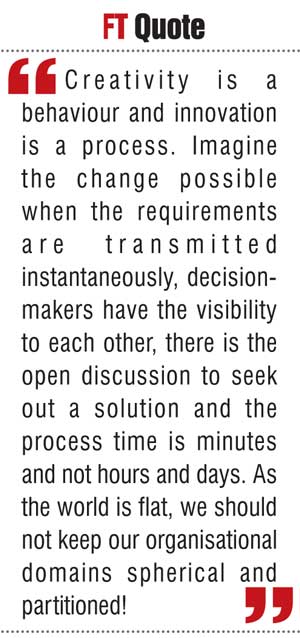Sunday Feb 15, 2026
Sunday Feb 15, 2026
Thursday, 10 March 2016 00:00 - - {{hitsCtrl.values.hits}}

In Government organisations Wednesday is the Public Day, where the public come into seek redress to their multitude of issues. Government officials are supposed to be present on this day ready to serve diligently the public. You will have from Ministers downward present in their respective offices. Occasionally we also hear that mobile offices have been put into practice and as a result that more than thousand grievances had been addressed. What a relief!
However, quantitative data from Public Days at actual office levels are not available, nor are the stakeholders’ perspectives available as the sun sets on a Wednesday. It is an imperative that the Sri Lankan public office be revamped to realise efficiency and effectiveness.
Even if the salary conditions are not quite right, there are enough examples to show people giving up private sector jobs to get into the public sector. The enthusiasm is sometimes quite infectious and you may be excused for thinking that we really have a public-spirited society with a serving mentality. When following the footsteps of Toyoda and start asking Five Whys, you do not need to exhaust all questions to understand that pensions and job guarantees are a major reason for the choice.
 Need to address inefficiencies
Need to address inefficiencies
The need to address inefficiencies… You hear of Deputy Ministers who wait for weeks to get their business cards, Ministers whose decisions take months to percolate downwards, Secretaries waiting expectantly for presentations well passed the required date… This is time lost at the highest level of the echelon.
Then you hear of a file taking multiple hours and sometimes days to go from one table to another. It is not too uncommon for letters and files to disappear in the process and at time while going from one level to another along the stairway of a building. It is usually the case that when we sit down tea and lunch times these are the times to get up and move and that is too for a very specific reason. You do not like the exercise and allowing some blood to circulate taking the file to your colleague so that he or she can proceed with the work.
People may come in one Wednesday and leave with all expectations that their task is being attended to only to understand later that work is progressing and you have to come again and again. However, we leapt with joy when training is offered and the CVs invariably get better and better. It is sad that the system that you belong to is not making any headway and the society that is being served; only the debts accumulate and intermittent economic statements are necessary to communicate the impending doom to justify action.
That we must all forcefully look at the efficiency based on KPIs is a must with the templates kept simple. There is the dire need to bring in technology to support the administration process. Sometimes it is mushroom type management that we see in places – keeping people in the dark and being fed with waste!
A different type of manager
It is in this context that I see the need to inculcate and move for a different type of manager – Serendipitous Manager. He or she will be one with whom opportunities and problems creatively merge. This type of manager need not be necessarily at the top, but they can be anywhere. It is just that they should be a creative in their endeavours and with such people we will be able to do away with public days and certainly mobile offices.
We should understand the importance of efficiency and its potential to contribute to growth. Growth opportunities are everywhere. As a Sri Lankan the word serendipity and its use in literature alone is sufficient to indicate this aspect – looking for something and finding something even better. Hence the importance of reaching a common understanding that opportunities abound! We should have people within an office who view their presence to do something than spend time according to a circular.
We may at times feel that public organisations are different and that they are different to private enterprises. Lee Kwan Yew understood well the importance of public office and its potential and it was not about pension and tenure.
If one wants to understand how opportunities should be visualised, understood and made use of it is important to read Kim Woo-Choong’s (Founder, Daewoo) biography, ‘Every Street is Paved with Gold’. The onus is on the manager to seek out the opportunity and for conversion.
Woo was a penniless paperboy who went on to conceive and develop the Daewoo group – the pride of Korea. He sought out opportunities and solved all problems and the rest is history. However, past the biography his story updated gives us another  message.
message.
The Serendipitous Manager should ensure honesty too in the organisation and within. Woo after amassing wealth failed in this regard, succumbing perhaps to some different pressures differently and paying a price.
While you allow every level of leadership to be creative, the organisational value system should not be allowed to erode. In the absence of efficiency there is no pride for the system anyway as the organisation cannot be viewed as a unit that is known to deliver.
If the common perception by the public stems from examples such as what I have cited above, then you know the type of label that your organisation carries. Then there should be the interest in an individual to feel bad, and with voices from within to do something to change. They are the potential managers that you need to empower.
Public sector has to solve problems, create opportunities to themselves and others and be there to generate growth. The managers within thus should be problem solvers. Answer to problems should not come from a file containing circulars. The absence of a circular detailing how to behave and act for a situation should not make the person idle but should allow the person to move on with a spirit of positive result. We just cannot have people moving on with a conservative mindset of waiting for the circular telling what to do but collecting the salary.
Service innovation
For the public sector it is service innovation that one seeks. When creativity sees the light of day with an answer to a problem, then it is innovation. With a Serendipitous Manager in action, each person entering with a grievance will hear something positive and very much be able to see the light at the end of the tunnel.
A manager with a creative decision making style will not usually come out with a statement, “Let me see, I will get this letter to A and B and let us see what happens – Thank you, next one please!”
Creativity is a behaviour and innovation is a process. Imagine the change possible when the requirements are transmitted instantaneously, decision-makers have the visibility to each other, there is the open discussion to seek out a solution and the process time is minutes and not hours and days. As the world is flat, we should not keep our organisational domains spherical and partitioned!
It is at times difficult to view the ICT tools used in public offices and even when present tune in to the gossip sites of the web! Decision-making spaces are much more prone to have in and out trays and files towers, partially hiding the faces. These have guaranteed time delays which definitely put back the nation by years considering the pace of change today. On top of all this we do have our share of holidays to rest after a gruelling stint of public service.
We should get the understanding of the creative process to our public officers. We must change the environments where there is the strong top-down, recipe-based decision-making. Such environments will have a few answers to most of the problems which are unlikely to be solutions at all.
I just cannot imagine the possibilities of creative managers within public spaces. Creative managers continually meet new challenges, and recognise and pursue new opportunities through innovations. They will continuously try to seek improvements to their own ways of doing things and that too is an important element. Remember here is serendipity from within – you seek out new ways and come out very much better many a time.
Sam Walton, a founder of Wal-Mart, once said: “I have always been driven to buck the system, to innovate, to take things beyond where they have been.” An innovative problem solver and an opportunity seeker to the core. May that tribe grow in Sri Lanka and especially within the public sector because then the growth is for everybody and the nation!